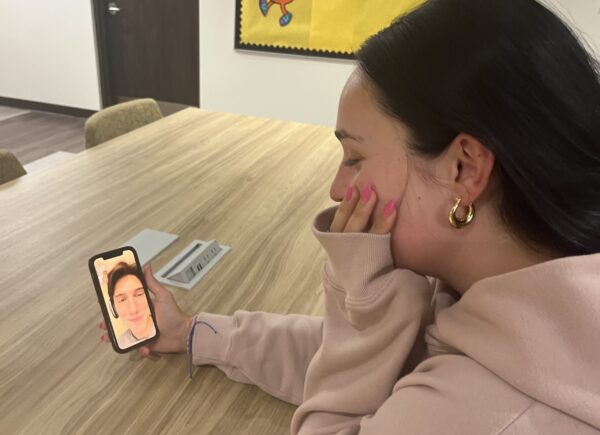Maddie Collins, a sophomore at the University of South Florida, sits in her room on Facetime with her boyfriend, Luca Daniels. They catch up about their day, laugh and joke about things that have happened, and talk about when they’re going to see each other next. Daniels goes to school at the University of Tennessee, about 664 miles away. The two started dating at the end of their senior year and three months later, right in the middle of their “honeymoon phase,” the two left for college.
Many people doubted the couple, saying they wouldn’t last, that they should split and enjoy college, that they should learn to grow on their own. The couple ignored them though and will reach their two-year anniversary at the end of this month.
Research shows that about 75% of college students are in a long-distance relationship at some point in their academic life, and there are many different opinions about whether they work in college or not. There are arguments that if you really love them, then you can work through the distance. Others argue to break it off and really go for the “college experience,” meaning doing what you want without a significant other to hold you back.
So, do long-distance relationships really work in college, and if so, are they worth it?
One expert says it depends on the person.
“Whether long-distance dating is ‘worth it’ in college is highly individual in my opinion,” said Dr. Alison Rossano. “For some, the commitment can strengthen the bond between partners, building a foundation of trust and communication that benefits the relationship in the long term…. For others, the strain of a long-distance relationship can be a source of constant stress and anxiety, potentially impacting personal growth and negatively affecting the college experience.”
When thinking about a healthy relationship, there are lots of things it needs to work. Trust, communication, loyalty, and more are needed. The difference between a normal relationship and a long-distance one is that when you’re long-distance, you need to exercise these traits much more.
“I only think that long-distance relationships can work if both people in the relationship are on the same page about what they want out of the relationship and on what their boundaries are,” Collins said. “There has to be very, very clearly set expectations and boundaries on things that both partners are going to do to make the relationship work.”
According to relationshipsadvice.com, 32.5% of all long-distance relationships are college relationships. They also say that only 2% of high school relationships last through long-distance, and 22% of people in long-distance relationships admitted to cheating on their partner.
There are a lot of statistics that say long-distance doesn’t work. While there definitely are situations where they can work, a lot of people think that they are not worth it, especially during college. One of those people is Joelle Kratzert, a USF student who did long-distance for four months before breaking up.
“I personally don’t think it’s worth it because I feel like it’s the biggest time where you get to learn about yourself, and I feel like being in a long-distance relationship holds you back from that,” Kratzert said.
Coming into college in a long-distance relationship could interfere with things like connection to the university and even health, according to the article “Long-distance Dating Relationships, Relationship Dissolution, and College Adjustment.”
If you’re focused on when to call your partner even if it interferes with other plans, or you’re worried that they might not like something you want to do, it can cause strain in your relationship and it can lead you to miss opportunities on or around your campus. Things like these can build resentment towards your partner, even if you don’t aim for it to be that way.
College is also a very pivotal time in student’s lives for personal growth and learning.
“College students are not only navigating their education and future careers but are also in a critical period of personal development and working to form their own identity. The absence of a partner during such a transformative phase as college can feel more pronounced for these reasons,” said Dr. Rossano.
This was true for Kratzert who struggled with her own personal growth her freshman year.
“I felt like I was putting all of my energy into preserving my relationship and it didn’t give me time for focusing on myself and focusing on my own self-growth,” Kratzert said.
On the opposite end, Collins says that her boyfriend helped her.
“Being long distance forced me to work on myself and learn how to be alone and independent,” Collins says. “We grew separately and then grew together, and he was so patient and reassuring with me that he made it easy.”
So, when it comes to long-distance there are many pros and cons. It all depends on what the individuals in the relationships want and if they are willing to work for it. The physical distance doesn’t have to outweigh the emotional distance. Taking time to communicate, set boundaries, and more can make all the difference when you’re physically separated.

